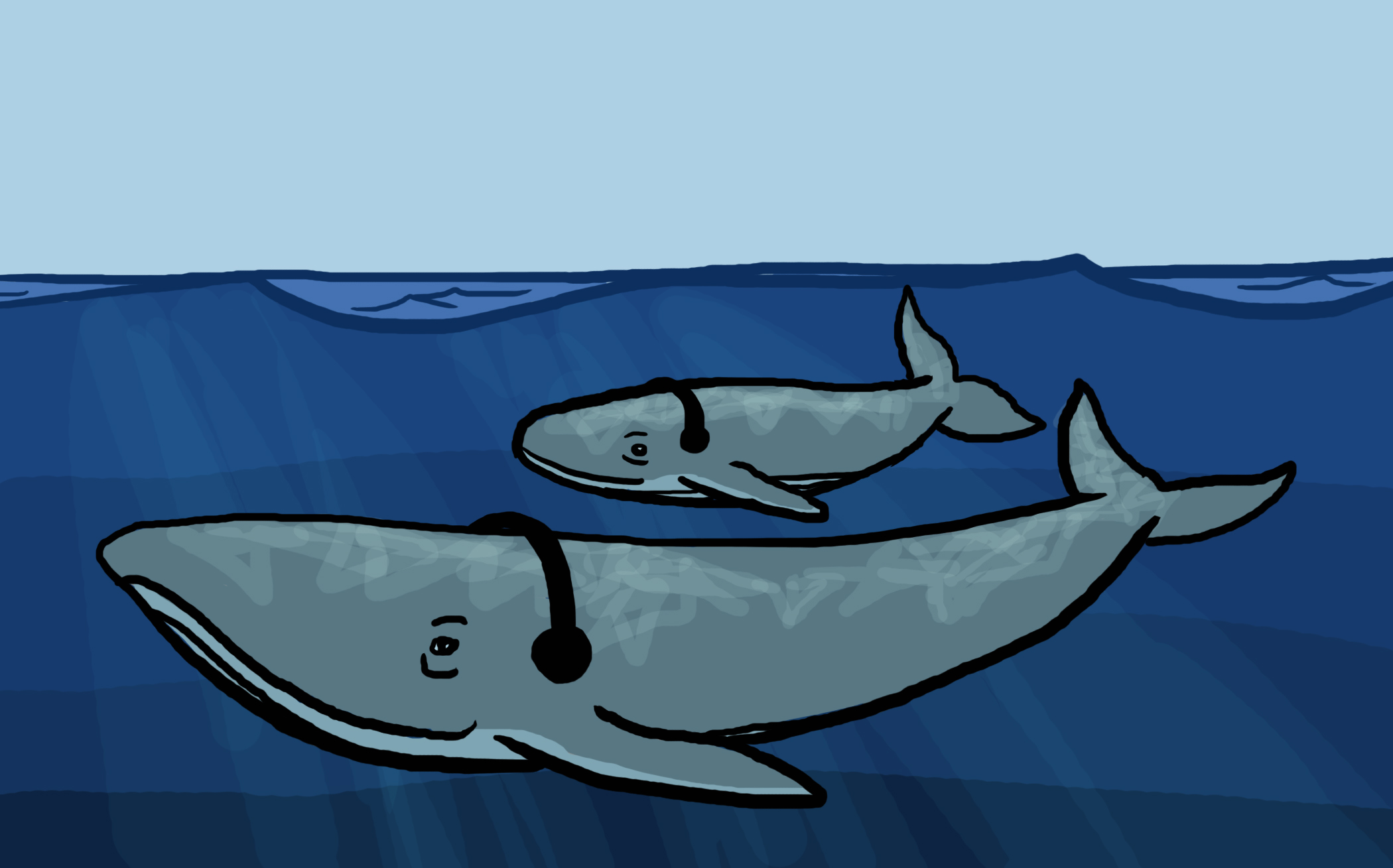Graphic by Callie Wohlgemuth ’21
BY FIONA HINDS ’21
Marine life is highly influenced by sound. According to the International Fund for Animal Welfare, many ocean dwelling creatures, such as whales, dolphins, shrimp, squid, octopi, fish and plankton rely on sound to find prey or communicate, often over great distances. About 20,000 known species of fish can hear, and some 800 species are known to make their own sounds to hunt, mate, navigate, and communicate. However, over the last century, anthropogenic — or man-made — noises in the ocean, such as noise created by shipping, oil and gas exploration, naval sonar training and construction have greatly expanded. Today, over 90% of global trade is seaborne, and the noise generated by anthropogenic sounds in the ocean has affected patterns of marine life. Foreign sounds in the ocean have led to stress, deafness, diminished feeding opportunities, loss of communication and death among sea life.
In a landmark study, after the decrease in ocean traffic following the events of 9/11, researchers noted a significant drop in stress hormones in the feces of right whales in the Bay of Fundy in Canada. The was the first evidence that ship noise can cause chronic stress in whales.
According to the New York Times, blasts from container ships’ seismic air guns are likely the loudest noises set off regularly underwater. These guns are used to map out the location of underwater deposits of oil and gas, sending sound waves miles into the ocean floor. Their impact can be detected 4,000 kilometers away. And they’re about to become a lot more prevalent: the Trump administration has rolled back environmental policies that protect the Eastern Seaboard from noise pollution, opening offshore drilling from Central Florida to the Northeast.
The blasts from these air guns can be extremely harmful to the marine ecosystem. A study from 2017 cited in the New York Times found that one blast killed nearly two-thirds of the zooplankton in a three-quarter mile radius. Zooplankton are tiny organisms at the bottom of the food chain, and are a food source for everything from great whales to shrimp. Krill, a tiny crustacean vital to the diets of whales, were also impacted by the blast.
Each seismic shot from the air guns can reach up to 200 underwater decibels. Container ships, another noisemaker on the seas, make sounds up to 190 decibels, which is equivalent to about 130 decibels in the atmosphere. Since water is much more dense than air, sound travels underwater about four times faster and much farther than it would in the atmosphere.
“This is one of those assaults that I suspect is really harmful for marine life — mammals in particular, but with an impact that is hard to assess,” said Professor of Geology Al Werner, who teaches an oceanography course. “Perhaps even more egregious is what the navy wants to do or is doing! The plan is to blast loud acoustic energy from the west coast to Hawaii to ‘scan’ for submarines.”
Navy sonar systems are used as a primary means of submarine detection, and can be used to scan both deep sea and shallow ocean environments for submarines. This sonar emits a high-intensity sound that can negatively affect marine creatures, especially beaked whales. Studies have shown that beaked whales will stop feeding, stop communicating, abandon their habitat, and even beach themselves when exposed to sonar.
Under the Marine Mammal Protection Act, harming or injuring marine mammals is forbidden. In November 2018, the National Oceanic and Atmospheric Administration (NOAA) issued five authorizations which allowed seismic exploration companies to “incidentally, but not intentionally, harass marine mammals.” The companies involved in the exploration disagree with the claims of harm that have been leveled against them. However, prolonged periods of stress is a form of harm, too. “Prolonged chronic stress of any kind is bad, because it shunts resources away from reproduction,” Dr. Nowacek, a professor of marine conservation technology at Duke University, reported. “It presses your adrenal glands to produce adrenaline and stress hormones, causes weight loss and immunosuppression.”
Noise pollution in the ocean is only expected to get worse in coming year

